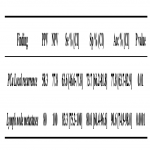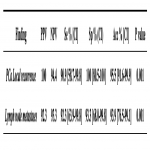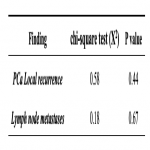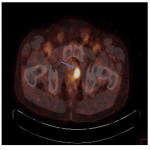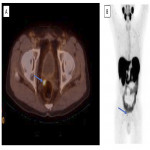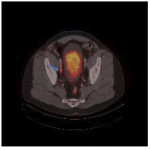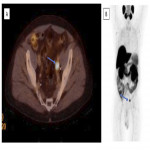Purpose
New radiopharmaceuticals 68Ga-PSMA-11 and 18F-PSMA-1007 have substantially increased the diagnostic scope of radionuclide imaging for recurrent prostate cancer (PCa) and treatment strategy. Hybrid imaging with Positron emission tomography in combination with computer tomography (PET/CT) is a functional and anatomical non-invasive imaging modality used in the detection and staging of prostate cancer, in the evaluation of treatment efficacy and localization of recurrence [1]. Comparing both, 68Ga-PSMA-11 ligand has a drawback in the assessment of small local recurrences, which is its excretion via the kidneys and high...
Methods and materials
This retrospective study included 50 PCa patients with biochemical relapse referred for PET/CT - 32 patients underwent 68Ga-PSMA-11 PET/CT and 28 patients - 18F-PSMA-1007 PET/CT. Patients were previously treated with radical prostatectomy and/or radiation therapy. The results were compared using a reference standard that was based on clinical data and follow-up information. According to the reference standard all results of examinations were classified as true positive, false positive, true negative or false negative. The diagnostic accuracy of each method - 68Ga-PSMA-11 PET/CT and 18F-PSMA-1007 PET/CT...
Results
Total 50 patients were divided in two groups - 68Ga-PSMA-11 and 18F-PSMA-1007 group. 32 patients underwent 68Ga-PSMA-11 PET/CT and 28 patients - 18F-PSMA-1007 PET/CT. Mean patient age in groups - 63±7 vs. 66.67±6.8 years, age range 49–81 vs. 52-84. Mean PSA value at the time of the studies were 2.27 ng/ml vs. 1.97 ng/ml. Median Gleason score - 7 vs.7 , range 5-10 vs. 5-9. PSA median doubling time 4.6 months vs. 7.9 months.
According to the clinically defined standard of reference, local recurrence of...
Conclusion
Both PSMA ligands showed high accuracy for evaluation of early (biochemically) recurrent prostate cancer, but this comparative study shows tendency of potential advantages of 18F-PSMA-1007 PET/CT over 68Ga-PSMA-11 PET/CT both in local recurrence and regional lymph node metastases.
Funding for this study:Latvian Council of Science, Funding number: lzp-2019/1-0056 “ Impact of Targeted Molecular Imaging with 18F-PSMA-1007 and 68Ga-PSMA- 11 PET/CT in Multimodal Evaluation of Recurrent Prostate Cancer”.
Personal information and conflict of interest
L. Saule:
Nothing to disclose
M. Radzina:
Nothing to disclose
M. Liepa:
Nothing to disclose
A. Lioznovs:
Nothing to disclose
L. Roznere:
Nothing to disclose
L. Friebe:
Nothing to disclose
M. Kalnina:
Nothing to disclose
E. Mamis:
Nothing to disclose
E. Vjaters:
Nothing to disclose
References
1 - Rowe SP, Macura KJ, Mena E, et al. PSMA-Based [(18)F]DCFPyL PET/CT Is Superior to Conventional Imaging for Lesion Detection in Patients with Metastatic Prostate Cancer. Mol Imaging Biol. 2016;18(3):411-419. doi:10.1007/s11307-016-0957-6
2-Radzina M, Tirane M, Roznere L, Zemniece L, Dronka L, Kalnina M, Mamis E, Biederer J, Lietuvietis V, Freimanis A, Vjaters E. Accuracy of 68Ga-PSMA-11 PET/CT and multiparametric MRI for the detection of local tumor and lymph node metastases in early biochemical recurrence of prostate cancer. Am J Nucl Med Mol Imaging. 2020...

